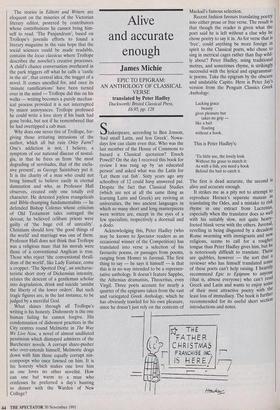Alive and accurate enough
James Michie
EPIC TO EPIGRAM: AN ANTHOLOGY OF CLASSICAL VERSE translated by Peter Hadley Duckworth/ Bristol Classical Press, £6.95, pp. 128 Shakespeare, according to Ben Jonson, `had small Latin, and less Greek'. Nowa- days few can claim even that. Who was the last member of the House of Commons to hazard a Classical quotation? Enoch Powell? On the day I received this book for review I was rung up by 'an educated person' and asked what was the Latin for `Let them eat fish'. Sixty years ago any schoolboy of 12 could have answered pat. Despite the fact that Classical Studies (which are not at all the same thing as learning Latin and Greek) are reviving at universities, the two ancient languages in which so many short and long masterpieces were written are, except in the eyes of a few specialists, respectively a doornail and a dodo.
Acknowledging this, Peter Hadley (who may be known to Spectator readers as an occasional winner of the Competition) has translated into verse a selection of his favourite poems, or passages from poems, ranging from Homer to Juvenal. The first thing to say — he says it himself — is that this is in no way intended to be a represen- tative anthology. It doesn't feature Sappho, the Athenian dramatists, Theocritus, even Virgil. Three poets account for nearly a quarter of the epigrams taken from the vast and variegated Greek Anthology, which he has obviously trawled for his own pleasure, since he doesn't just rely on the contents of Mackail's famous selection.
Recent fashion favours translating poetry into either prose or free verse. The result is that though the reader is given what the poet said he is left without a clue why he chose poetry to say it in. As for verse that is `free', could anything be more foreign in spirit to the Classical poets, who chose to sing in metrical cages rather than flap wild- ly about? Peter Hadley, using traditional metres, and sometimes rhyme, is strikingly successful with the lyrical and epigrammat- ic poems. Take the epigram by the obscure and undatable Capito. Here is Peter .Jay's version from the Penguin Classics Greek Anthology:
Lacking grace beauty gives pleasure but takes no grip like a bait floating without a hook.
This is Peter Hadley's:
'Tis little use, the lovely look Without the grace to match it: As with a fish, you need a hook Behind the bait to catch it.
The first is dead accurate, the second is alive and accurate enough.
It strikes me as a pity not to attempt to reproduce Horace's separate stanzas In translating the Odes, and a mistake to risk rhyme in one extract from Lucretius, especially when the translator does so well with his suitably slow, not quite heavy- footed blank verse with the others. Juvenal, revelling in being disgusted by a decadent Rome swarming with immigrants and new religions, seems to call for a rougher tongue than Peter Hadley gives him, but he is notoriously difficult to translate. These are quibbles, however — the sort that a reviewer who has himself translated some of these poets can't help raising. I heartily recommend Epic to Epigram to anyone (that is, almost everyone) who can't read Greek and Latin and wants to enjoy some of their most attractive poetry with the least loss of immediacy. The book is further recommended for its useful short section introductions and notes.










































































 Previous page
Previous page